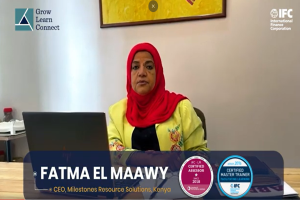Self-reflective tools
I was going through my old files a few days ago when I saw my article on self-reflection. I asked myself, “Ama, why didn’t you go back to write the article on self-reflective tools that you promised your colleagues?”. Unfortunately, I was guilty with no explanation. Let’s just say that I took a good look at myself in the mirror and realized that I had to step up my game! To help me get back on track, I’d like us to take a brief look at what we discussed in the first article.
In the previous article, we discussed self-reflection and the benefits of practicing self-reflection as a learning and development professional. We will build on that foundation now by looking at some common tools for practicing self-reflection.
These tools include:
- Self-talk
- Reflective learning journals
- Reflective writing exercises
- Incident analyses or critical reflections
- Lesson evaluations
- Observations
- Learner dialogues
I have decided to chunk this section on self-reflection tools into four (4) articles. This segmentation will allow us to keep each write-up brief and easily readable while simultaneously enabling us to give ample attention to each tool. In this article, I would like to focus on self-talk and reflective & learning journals. I hope you have prepared yourself a good cup of tea or coffee; if you have, relax, and find yourself a quiet place as we start with Self-Talk.
Self-Talk
I love self-talk, I do it all the time. When I engage in self-talk, I shed my professional mask and I forgo the name Margaret completely, instead, I am Ama. Ama is a Ghanaian-Akan name given to girls born on Saturday like I was, and Ama reflects my most intimate self. She is a treasure beyond compare and I love talking to her; when we talk, it helps me to consider my ways of thinking. Sometimes when I am reading an article or manual or watching a YouTube video (the list could go on and on) I ask Ama “what do we find confusing?”, and “do we know this?” Throughout my life, Ama has been my main woman.
As a learning and development professional hearing yourself talk out loud can be a great way to self-reflect. It is said that speaking to yourself out loud helps you to slow down your thoughts and process them differently because you are engaging the language centers of your brain.
When you engage in self-explaining it unleashes impulses of curiosity that may otherwise remain unexplored. It causes you to ask the question, “Why?”. If you are knowledgeable about a topic, you realize that the “why” questions are easy but when you are a little less familiar with a certain subject matter, the “why” questions become very difficult. However, not knowing all the answers provides you with a beautiful opportunity to develop a new area of expertise.
Below are some pros and cons of self-talk (self-explaining), that I think you may find helpful.
Pros
Helps you to slow down your thoughts and process them differently. For example, you may:
- see new links and associations
- unleash impulses of creativity that may otherwise remain unexplored
- challenge your thoughts
- put your thoughts into a better perspective
Helps improve memory and helps you learn better
Helps you make more deliberate choices
Cons
- Has a bad reputation, often seen as a sign of mental distress.
- Can be harmful and bring you down when self-talk gets into the realm of excessive negativity.
Reflective and Learning Journals.
Keeping journals is one of the best techniques of self-reflection. I wonder why I did not keep a journal when I was young. I wish I had started journaling early but as the saying goes, “better late than never”. It was when I attended my first Training of Trainers (ToT) that I started appreciating the value of journaling. I realized that in my line of work, learning journals help me to record lessons learned, as well as my thoughts, feelings, and observations regarding the lesson. Having a learning journal helps me to track any recurring habits or thoughts. As a learning and development professional, keeping a reflective journal may help you reflect on your lesson delivery, the success of your learners, ways of working in the classroom, lesson notes, questioning techniques, how to improve your delivery skills, etc. You can develop your reflective journal by:
- Writing down what happened
- Pondering over your reactions, feelings, and thoughts about the lesson
- Examining
- Concluding
- Developing an action plan
I would like to end this chunk by sharing below some Pros and Cons of Reflective Journaling
Pros
- Helps to improve your writing skills
- Helps in personal development
- Encourages a questioning attitude toward various problems and issues
- Helps retain experiences in the form of written documents
Cons
- It can be time-consuming
- You may or may not be honestly disclosing your perspective
- Need a clear idea of the situation and perspective before writing the journal
Keep on self-talking and journaling till my next article!
References
- https://www.pexels.com/photo/closeup-photo-of-journal-book-and-pencils-1018133/
- https://www.sidmartinbio.org/what-are-the-disadvantages-of-reflective-teaching/
- https://uwaterloo.ca/writing-and-communication-centre/critical-reflection
- https://lit.libguides.com/reflective-practice-tips/writing
- https://hbr.org/2017/05/talking-to-yourself-out-loud-can-help-you-learn





